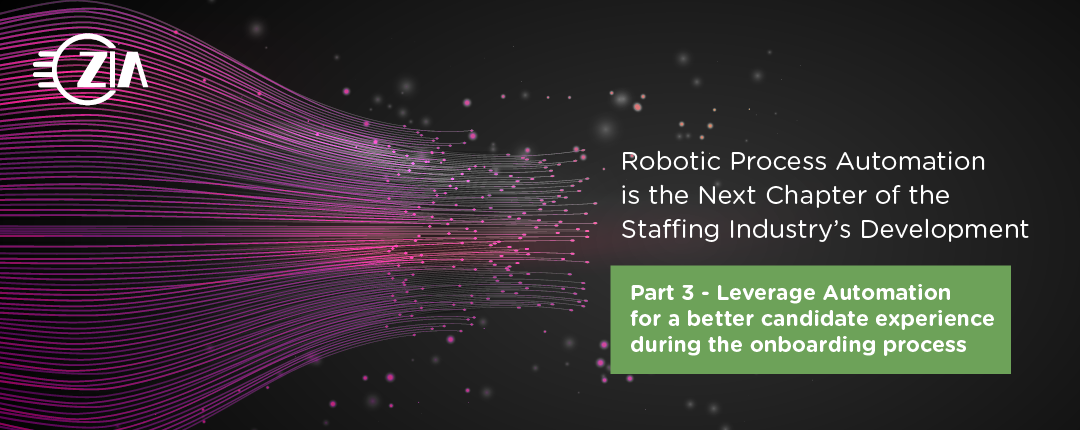In the earlier parts of this series, I outlined the great potential for RPA technology to add immediate value to the staffing industry. In previous articles we discussed the value of RPA in the sourcing process and how to create an overall smoother workflow experience for internal recruiters during the full cycle recruiting process. These foundational processes are vital for creating a candidate funnel of resources that ensures the appropriate number of candidates are interviewed and the best match is made for a customer’s job order. In order to achieve the value needed to differentiate, a staffing firm has to work at a fast pace and have internal processes that stand out in a highly competitive industry. This is one of the main reasons competitive firms invest in RPA technology. The critical onboarding process begins once a candidate is offered a role and accepts the new position.
The onboarding process is extremely important for revenue creation, customer satisfaction, and the overall candidate experience. In my experience leading teams at three different staffing firms, it was always perplexing how little attention was paid to this process. At most traditional recruiting firms, there is a keen focus on KPI metrics, such as open job orders, candidate submittals, number of interviews, and ultimately forming ratios of these vitals to actual placements.
I noticed how quickly the amount of work put into creating a placement unravels in the absence of a seamless and automated onboarding process. The rationale is that revenue isn’t created until a staffing resource begins their temporary assignment and submits their weekly timecard, which triggers a response to start the invoicing process on a weekly basis. A seamless onboarding process not only ensures that revenue is recognized and invoiced faster, but also increases the probability that a staffing resource will begin their assignment with the right tools for success.
While intuitive, it should be stated that a staffing resource that is supported and set up for success will have a higher chance of achieving success during their assignment. Ultimately, it will be more likely that their contract is extended, which ultimately creates additional revenue for a staffing firm. Conversely, if a staffing resource has a chaotic onboarding experience, the probability for success and loyalty to their staffing company decreases exponentially. In addition to the candidate’s experience being suboptimal as a contractor, the customer can have a bad perception of the staffing firm. This scenario creates an outcome where brand loyalty to the staffing firm decreases and their service becomes even more commoditized.
While there has been some modernization to the onboarding process, staffing firms are still filled with manual processes. Many organizations require paper applications, don’t have an ideal mobile experience, and require candidates to perform many manual processes throughout. This slows down the process and increases the probability of errors. Similar to the processes I addressed in earlier blogs in this series, I believe that RPA technology is a natural fit to improve onboarding and deliver value to all parties involved in the process.
While many aspects of the onboarding process can benefit from RPA technology, I recommend that you start with the following:
- Data Entry: RPA bots can seamlessly enter candidate information from resumes, applications, and other documents into the company’s applicant tracking system (ATS), or other internal software systems.
- Background Checks: RPA bots can be programmed to verify candidate information, such as education and employment history. This is done by cross-referencing the information with external databases online.
- Compliance checks: RPA bots can be programmed to check for compliance with ever changing industry regulations and company policies. These bots can also be used to comply with other local and federal legal requirements.
- Document management: RPA bots can help manage the documents required for onboarding, such as I-9 forms, W-4 forms, and employment contracts.
- Communication: RPA bots can be programmed to send out automated emails to candidates, informing them of their status in the onboarding process.
From a value standpoint, I believe that using RPA technology for onboarding contingent resources will yield desired outcomes, such as reduced error and increased productivity for front end operations employees. RPA bots can free up employees’ time, allowing them to focus on more strategic tasks that require human skills. This allows a more consultative onboarding experience and creates a better candidate experience, causing resources to choose a staffing company with this process as their preferred partner of choice. In times of record low unemployment, this is a key value proposition to consider as we saw with the war for talent in the past couple of years. Another thing to consider is the cost savings RPA technology can provide as it eliminates the need for additional staff or outsourcing during peak periods of hiring ramps at certain times of the business cycle.
RPA investments significantly improve the efficiency and accuracy of the onboarding process for staffing firms. By automating repetitive, rule-based tasks, RPA bots can help staffing firms focus on more strategic tasks and increase their productivity. Beyond RPA, Zia Consulting can help you build even more strategic technology portfolios that deliver enterprise automation (EA) or hyperautomation. Gartner’s 2022 report shared that this is the wave of the future. Zia Consulting’s deep expertise in RPA and converting unstructured content into structured data makes them highly focused and uniquely positioned to eventually enable the full automation of core back-end processes.
As a staffing industry veteran, I welcome the opportunity to help guide you through this process. I spent close to a decade overseeing multiple sales, delivery, and operations teams across a variety of markets. I’d like to leverage this experience by working with you to examine how your business operates and begin shifting your mindset to seeing automation as a core strategy for your business. If you are just beginning to explore your options, I would love to have an initial conversation. If you are already in the process of automating your agency, let’s connect and explore what’s possible. We can discuss how Zia Consulting’s expertise with hyperautomation and RPA will assist you on your journey. I look forward to hearing from you!

ABOUT THE AUTHOR
Matt Vanore, Enterprise Sales Director – Southeast
Matt has 10+ years of experience as a consultative sales professional primarily in the IT services industry. In past roles, Matt has led both Sales and Delivery teams to service fortune 500 clients in various industries such as Consumer Packaged Goods, Manufacturing, Hospitality, Manufacturing, Information Technology, Entertainment and Financial Services. Matt has a Finance degree and began his career as a group sales representative in the Insurance industry. Outside of work, Matt enjoys spending time with his family, playing poker, reading, and coaching youth sports.

